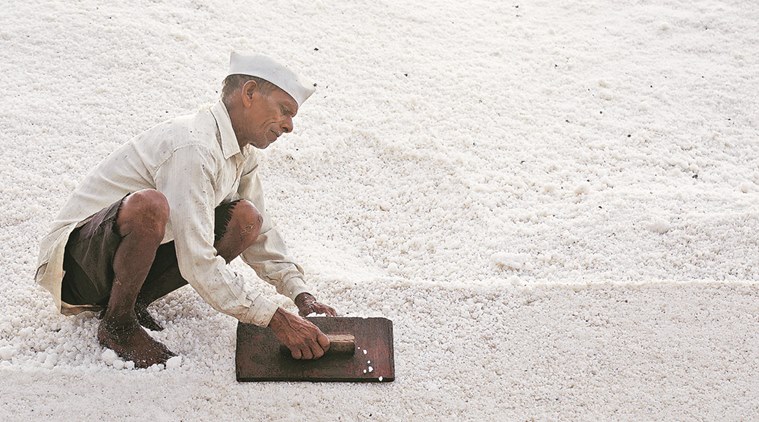Stay updated with the latest - Click here to follow us on Instagram
Salt Pan Workers: ‘The job requires both strength, skill’
Wearing socks, one person ploughs the prepared salt and gathers it in a heap on one side of the pan while another scoops it into a basket and a third person collect its. Carrying the basket on his head, he runs outside and dumps it forming huge white pyramids of salt.
 A worker at saltpans in Naigaon, Vasai. (Express photo by Nirmal Harindran)
A worker at saltpans in Naigaon, Vasai. (Express photo by Nirmal Harindran)
Well before the early morning sun, a group of men step out of their little shanties off the Wadala Chembur Road and head to the salt pan lands. Armed with their plough and shovel these salt pan workers then get to work. “We begin our day by collecting the salt that has crystalised the day before so that the land is ready to prepare fresh salt. We have to wake up early and clear the area before the sun is too high as it gets very difficult to work then,” said 41-year-old Rajesh Kimball.
Wearing socks, one person ploughs the prepared salt and gathers it in a heap on one side of the pan while another scoops it into a basket and a third person collect its. Carrying the basket on his head, he runs outside and dumps it forming huge white pyramids of salt. The harvesting is again repeated in the evening when the sun is almost about to set. “In the evenings, the water and the ground is very hot. Also the salt tends to prick our feet if we are barefoot. So most people prefer to work wearing socks. It is not possible to wear footwear while doing work as the ground is marshy and the slipper gets stuck in the ground,” said Prakash Bhavat, a 23-year-old worker.
 The labourers have to work for only close to three hours in a day — two hours in the morning and one hour in the evening. Yet it is a job that calls for both strength and skill. “Our legs pain in the evenings due to the hard labour. The baskets of salt are very heavy and running with them on our head takes a toll. This work is not something that everyone can do. It requires practice and skill,” said Harji Bhosal, another worker.
The labourers have to work for only close to three hours in a day — two hours in the morning and one hour in the evening. Yet it is a job that calls for both strength and skill. “Our legs pain in the evenings due to the hard labour. The baskets of salt are very heavy and running with them on our head takes a toll. This work is not something that everyone can do. It requires practice and skill,” said Harji Bhosal, another worker.
Most of the workers at the Wadala Salt pan land are farmers from Dahanu who come here to earn extra money. While women are seen working in other salt pan stretches in the city, strangely there are no women working on these salt pans. The men live in groups just outside the salt pans.
“We do farming of Jawar and Bajra back home. But it does not give us much money. So during the off season we come here to make extra money. We go home every month so there is no need for our family to come with us. It’s not a job that women can do,” said Bhosal. While a day’s work earns them Rs 230, it also means sitting idle for most of the day. “The work keeps us occupied only for a few hours. We do not have anything to do for the rest of the day. Most spend the day sleeping but for some the luxury of time has led them to bad habits like drinking,” said Mahad Damji.
While the older workers have got used to this schedule of work the younger boys yearn to move out of it. Bhavat said, “This will be the last season I’ll be working here. I’ll be joining one of the factories near my village or work as a construction labourer after the monsoon. This work tires me now.”







